| Author |
Message |
    
andrew
Moderator
Username: andrew
Post Number: 1336
Registered: 11-2001

| | Posted on Friday, January 20, 2006 - 06:33 pm: | 




|
I recieved the following by email, hopefully someone can help Doug ( [email protected] ) with some info on this wonderful engine...
quote:Hello;
To be honest, I know very little about this engine other than we have had it for numerous years and we have been doing research .....
I am attaching a picture to this email for you, maybe you could tell me more about it if you would be so kind. As I stated in the ad, the serial number is #777, and it states that it is a 35 to 40 horse.
I would appreciate any information you may provide.
Thanks
Doug
and
quote:Andrew;
I do appreciate and ask for your help in posting this in the discussion board. I am sending several pics of this motor for your use in this matter. If you require any further information, please feel free to contact me and I will get all I can on it. I appreciate you offer of help with this.
Thank you so much
Doug
Doug had also included a closeup of the nameplate but it did not come out. If you want to try again Doug, please do and send it to me. Sometimes digital cameras have a setting for "close-up". On my camera it is a symbol that looks like a flower.
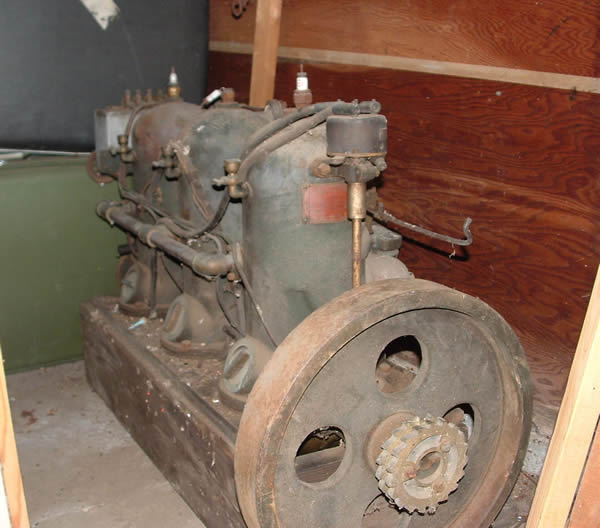
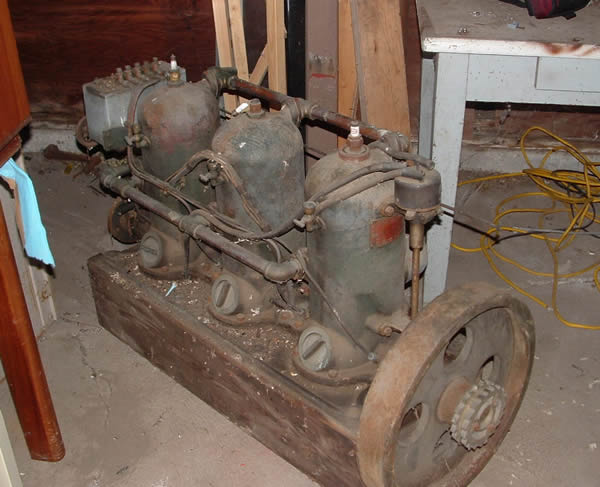
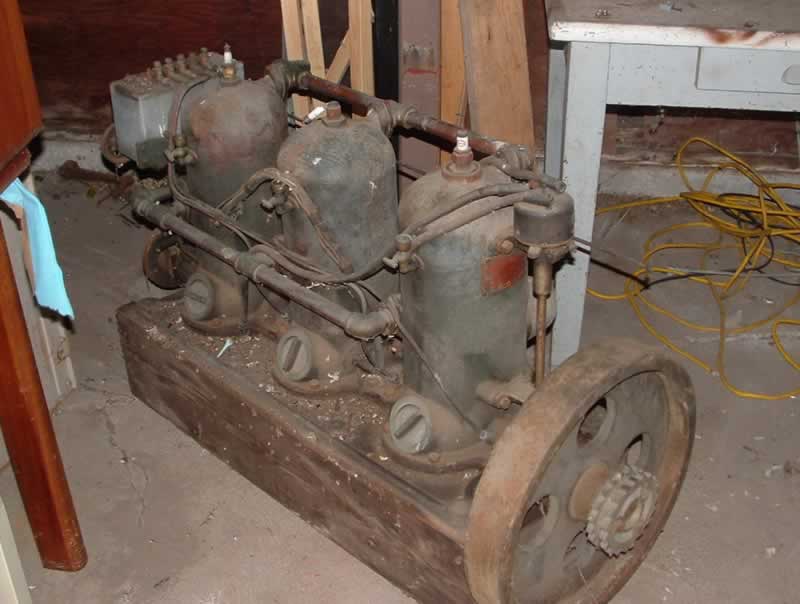

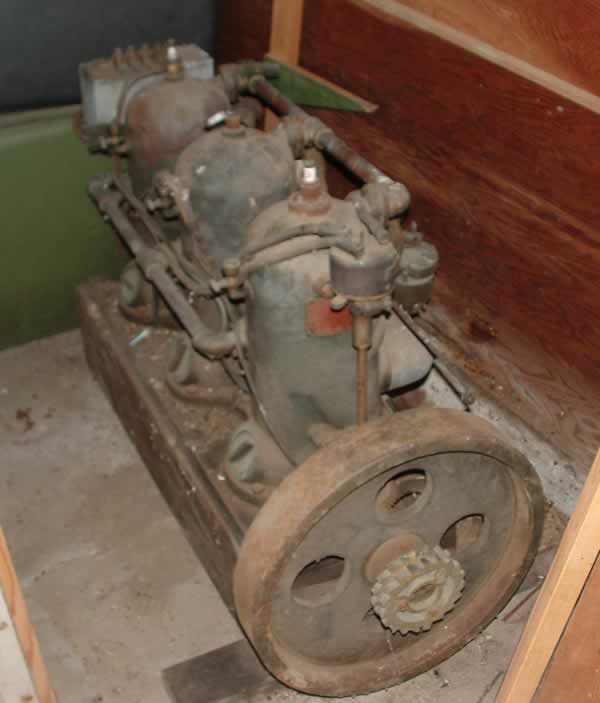
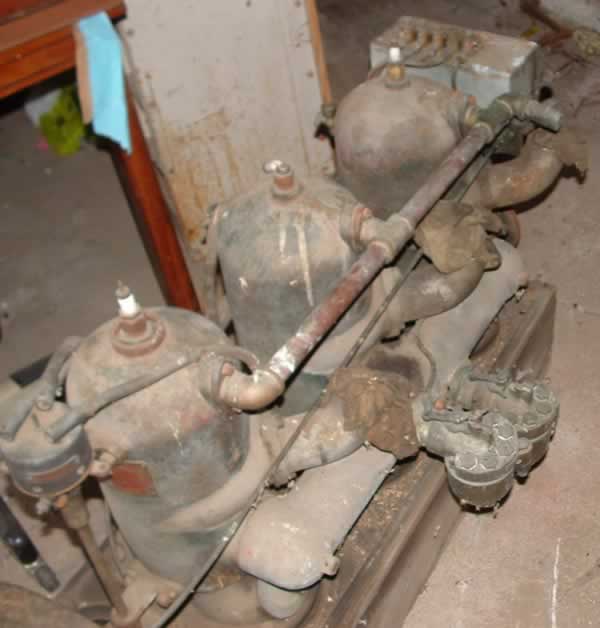

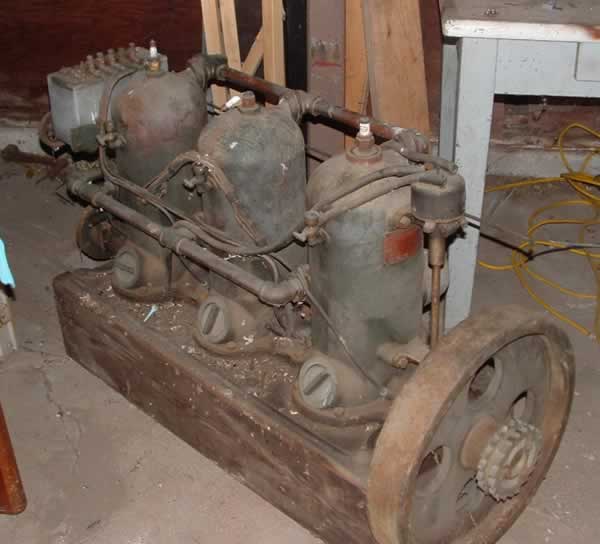
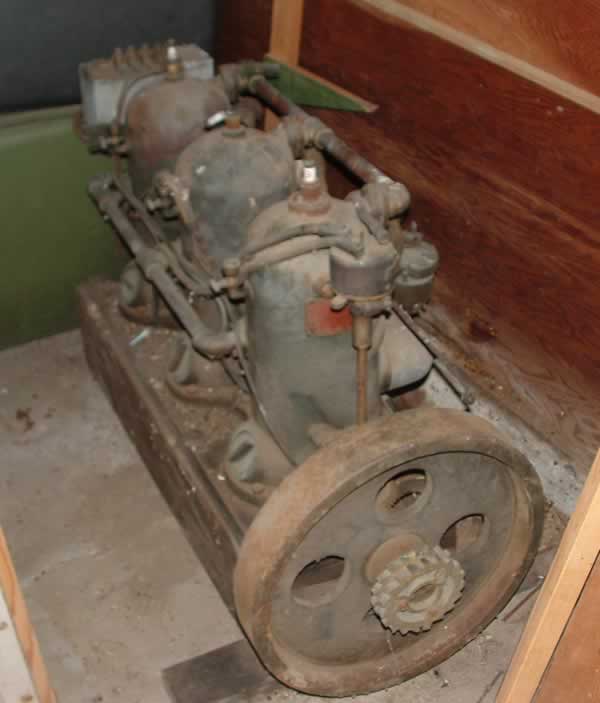 |
    
thomas
Senior Member
Username: thomas
Post Number: 306
Registered: 07-2002

| | Posted on Friday, January 20, 2006 - 07:01 pm: | 




|
I'm sure Richard has a NOS catalog :-)
I have a ratty Xerox of a 1915 but this is what it shows |
    
thomas
Senior Member
Username: thomas
Post Number: 307
Registered: 07-2002

| | Posted on Friday, January 20, 2006 - 07:04 pm: | 




|
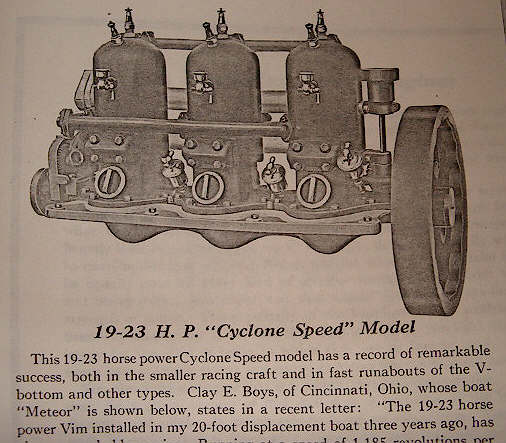 |
    
thomas
Senior Member
Username: thomas
Post Number: 308
Registered: 07-2002

| | Posted on Friday, January 20, 2006 - 07:06 pm: | 




|
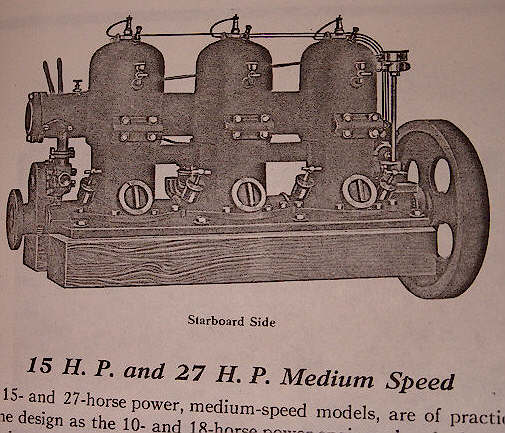 |
    
thomas
Senior Member
Username: thomas
Post Number: 309
Registered: 07-2002

| | Posted on Friday, January 20, 2006 - 07:11 pm: | 




|
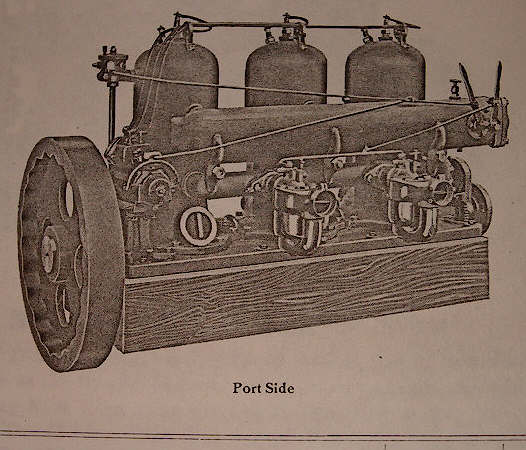 |
    
thomas
Senior Member
Username: thomas
Post Number: 310
Registered: 07-2002

| | Posted on Friday, January 20, 2006 - 07:13 pm: | 




|
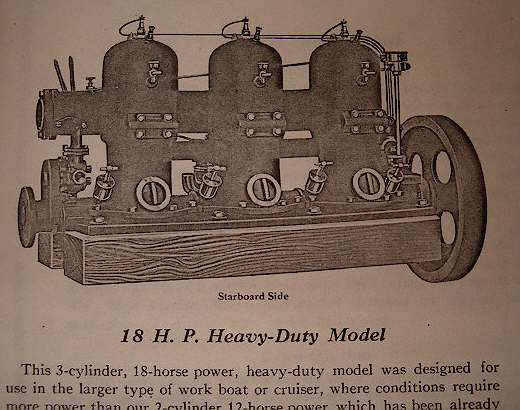 |
    
thomas
Senior Member
Username: thomas
Post Number: 311
Registered: 07-2002

| | Posted on Friday, January 20, 2006 - 07:15 pm: | 




|
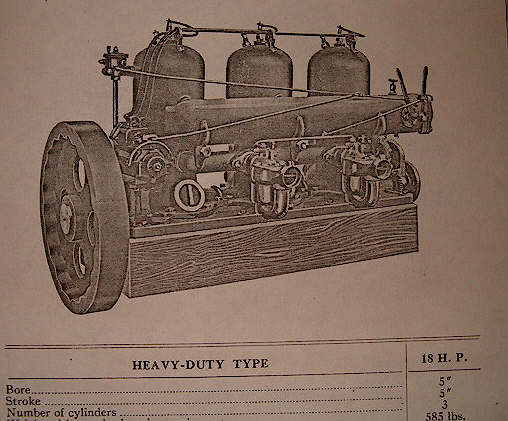 |
    
thomas
Senior Member
Username: thomas
Post Number: 312
Registered: 07-2002

| | Posted on Friday, January 20, 2006 - 07:18 pm: | 




|
It appears to me that your engine is the "Quicksilver" racing version. Unfortunately my Xerox does not have the other side of the QS,
must have been cut out.
NICE ENGINE!
T |
    
solarrog
Senior Member
Username: solarrog
Post Number: 211
Registered: 03-2002

| | Posted on Friday, January 20, 2006 - 07:43 pm: | 




|
I have a 2 cylinder vim in my collection. I am searching for a rod and piston for it, Pictures are at
http://albums.photo.epson.com/j/AlbumIndex?u=1659491&a=31588447&f=
I undersand this was designed by Buick before he started building cars
I do not time to resize them at this moment
Roger |
    
richarddurgee
Senior Member
Username: richarddurgee
Post Number: 968
Registered: 11-2001

| | Posted on Friday, January 20, 2006 - 08:42 pm: | 




|
Roger, Your mention of Buick and Vim relationship is a subject that I am interestd in, the name "Auto Vim" and "Buick" were used as trade names of engines made by David Buick.
This is a 1907 article and photo of an earlier Vim than the ones above, it gives credit for the marine engine in the photo as being designed by C.E.Barber and made by Vim Motors that was sold to The New Company (Vim Motor Mfging Co.of Sandusky Ohio)
Thinking out loud here- what was the old Vim Motors? a company making motors of different designers, for automobile, Marine etc ? Where were they Michigan or Ohio ? lots of old history to yet rediscover.
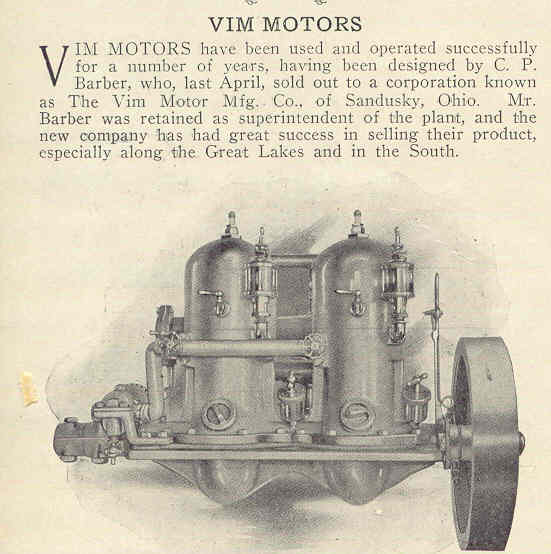
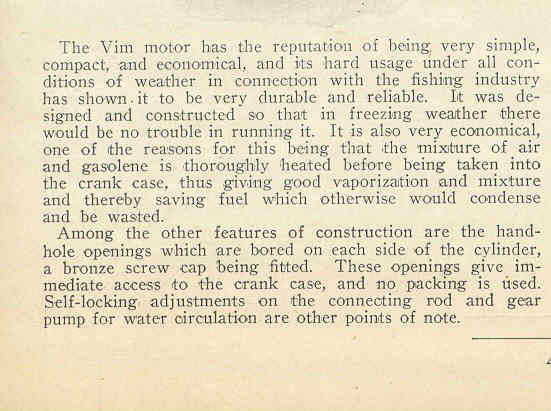 |
    
solarrog
Senior Member
Username: solarrog
Post Number: 212
Registered: 03-2002

| | Posted on Friday, January 20, 2006 - 09:21 pm: | 




|
Richard, I wish I knew more, What little I know is what I read in Stan Grayson's book, And CH Wendels book
Roger |
    
DickieG
Visitor
| | Posted on Friday, January 20, 2006 - 09:59 pm: | 




|
The Book "Seventy Years of Buick" by George H. Dammann states that the Buick Auto-Vim & Power Co was founded in 1901 for the purpose of producing a two cylinder L head engine primarily for marine use. |
    
richarddurgee
Senior Member
Username: richarddurgee
Post Number: 969
Registered: 11-2001

| | Posted on Saturday, January 21, 2006 - 10:15 am: | 




|
This is what I have accumulated from several sources so far on Buick !
David Dunbar Buik without the c, was born in arbroath, Scotland in 1854 came to Detroit with family in 1856. 1880's He was partner in a successful plumbing Co. Buick with The c added, invented and patented the process thats still used today of bonding porcelain to iron (bathtubs sinks etc). so if your taking a bath in one of these I guess your sort of riding in a "Buick".
1895-96 he was dabbling in marine & Stationary engines and left the plumbing business. By 1899-1900 he chose the name Auto-Vim & Power Company and mfgd engines. the 1900 address was at the bend of the Detroit River at Beaubien and Lafayette.
In 1902 The company name changed to "Buick Manufacturing Co.-- this is where I lose track, did Auto-Vim become Vim Motors that was mentioned in the above posting or was Vim Motors already some sort of affilliation or not related at all ??
1903 the Co. was sold and became Buick Motor Co.and moved from Detroit to Flint.
David Dunbar Buick 1854-1929
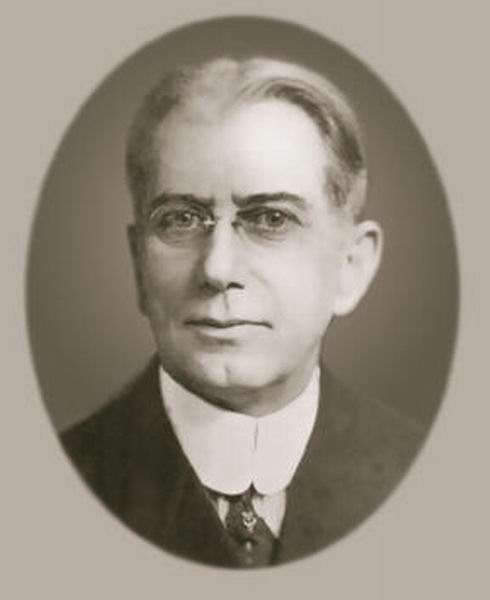 |
    
thomas
Senior Member
Username: thomas
Post Number: 313
Registered: 07-2002

| | Posted on Saturday, January 21, 2006 - 11:11 am: | 




|
The 1915 catalog states the Quicksilver engines were for hydroplanes or fast runabouts. The exhaust manifold was not water jacketed to save weight. It had an internal water spray for cooling. The largest engine listed anywhere in the catalog was a 24-25HP Quicksilver twin.
They list an optional "Mea" magneto and state that all engines had an extra sparkplug port built in for dual ignition.
The scalloped inner front flywheel edge (better grip for hand starting?) is shown on all the 1915 engines (at least where you can see the front of the flywheel) but Doug's Vim does not have it but rather it has the remains of the "ratchet lever" starter. Also, the 1915 catalog does not mention or show any mechanical lubricators. I assume Doug's engine it's a bit later than 1915. |
    
thomas
Senior Member
Username: thomas
Post Number: 314
Registered: 07-2002

| | Posted on Saturday, January 21, 2006 - 11:17 am: | 




|
Is Doug's engine a CCW unit? It appears that the starter would turn the flywheel CCW when viewed from the stern. I always thought that a "regular" engine used a Right hand prop which turns CW when viewed from the stern? Could this have been from a twin engine installation where one turned CW and the other CCW? |
    
richarddurgee
Senior Member
Username: richarddurgee
Post Number: 970
Registered: 11-2001

| | Posted on Sunday, January 22, 2006 - 08:53 am: | 




|
1916 Vim ad
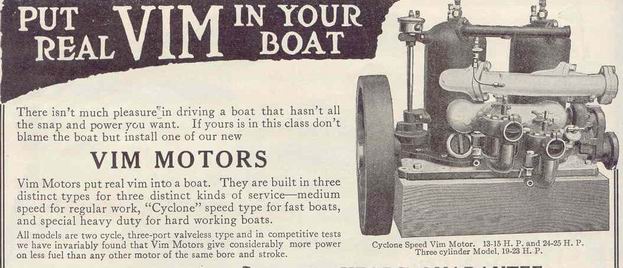

Tom
Thinking about rotation of this eng, I looked at my engs with ratchet gear teeth, mine are all 4 cycle and they are turned in direction of running rotation to bring one cyl up on compression stroke and fired by the spark, question is what is starting procedure with a big multi two stroke with ratchet device ? do you rock against compression and it fires in opposite direction ??? what happens if the eng starts backwards ?? interesting stuff !! |
    
thomas
Senior Member
Username: thomas
Post Number: 316
Registered: 07-2002

| | Posted on Sunday, January 22, 2006 - 10:27 am: | 




|
My Barber 4 cycle is the only engine with a ratchet that I have. The teeth are set to turn the engine CW when viewed from the stern (which is how it does in fact run).
Just to get it straight in my head I looked at a few props and the "RH" (right hand) props all turn CW (stern view) to drive the boat forward.
Do we think that Doug's engine is a WWI vintage or a 1920 or what?
One last thought; I see that the ratchet unit appears to be held to the flywheel with 3 bolts. Perhaps the owner could just unbolt it and reverse it so the teeth would be now facing the other way and the engine would start RH??
Tom |
    
jb_castagnos
Senior Member
Username: jb_castagnos
Post Number: 284
Registered: 07-2002
| | Posted on Sunday, January 22, 2006 - 01:36 pm: | 




|
Richard, when starting an engine with a crank or lever it is imperative that the timing be zero or after tdc, and the engine is pulled through compression. On a big engine with the lever and ratchet, it's likely that the lever would go through the bottom of the boat if started against high timing. When I got a Model T Ford, an old timer looked at the crank and said "they fitted you for a cast when you bought one a Model T." |
    
richarddurgee
Senior Member
Username: richarddurgee
Post Number: 971
Registered: 11-2001

| | Posted on Sunday, January 22, 2006 - 02:16 pm: | 




|
Tom
This is a 1911 ad shows the new Extreme High Speed engine, the 1916 ad above is the last Vim ad I can find so it looks like WWI may have taken them out of business?
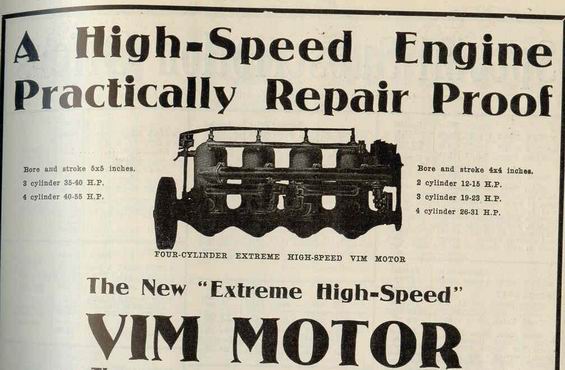
Your 1915 catalog mentions the exhaust water cooling sprayer which can be seen in the 1916 ad above.
So if 1911 was first year and by 1915 it was called Cyclone with exhaust water sprayer , Doug's engine above deosn't seem to have sprayer so I guess his eng is 1911-1914 ?? |
    
richarddurgee
Senior Member
Username: richarddurgee
Post Number: 972
Registered: 11-2001

| | Posted on Sunday, January 22, 2006 - 03:00 pm: | 




|
JB
My uncle was born in 1880's and lived until 1980's, his father owned a blacksmith and carriage shop in a small town in upsate N.Y., very early 1900's the first trucks with hard rubber tires and chain drives came to town and him being the new generation he was elected to be the mechanic and work on them. he told me stories of those cranks hitting him on the wrist & forearm and a few times in the head, he showed me the scars! The drivers he said tried to park on a hill if they could, the colder the temperature the higher up the hill they parked !
They also had the only gas pump in town and one day the first automobile ever seen there drove in, while pumping the gas my uncle asked the man what it was like to have your own automobile, after some thought he said it was very much like keeping a woman on the side, they are nice to have but can be very temperamental at times, required a lot of attention and are rather expensive! |
    
thomas
Senior Member
Username: thomas
Post Number: 317
Registered: 07-2002

| | Posted on Sunday, January 22, 2006 - 03:20 pm: | 




|
I see what looks like a mechanical lubricator on the 1911 ad you scanned and for that reason I would probably agree with you that Doug's engine could be around 1911 to 1914. NOTE: Dougs engine has three exhaust "elbow flanges" that bolt to each cylinder. (there are rags stuffed into two of them). There is a real "manifold" section shown on your 1911 and 1916 ads that has mating, oval shaped 2-bolt ports that connect with each of the three "elbow flanges" to carry the exhaust of the 3 cylinders all to one exhaust pipe. In the 1916 ad, the water tube connects to that "real manifold" and not the "elbow flange". Thus it seems to me that whoever took off the "manifold" also had to take off the water tube & connection. I tried to blow up a section of the foward cylinder and I see what is probably the threaded opening for the water spray tube. I will attach a picture. Look just below the water elbow.
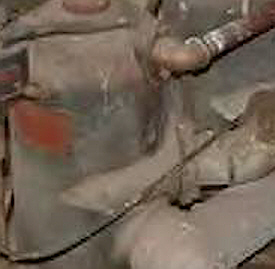 |
    
richarddurgee
Senior Member
Username: richarddurgee
Post Number: 974
Registered: 11-2001

| | Posted on Sunday, January 22, 2006 - 04:34 pm: | 




|
Maybe if Doug is at home and reading this he could look for the fitting ! |
    
richarddurgee
Senior Member
Username: richarddurgee
Post Number: 975
Registered: 11-2001

| | Posted on Sunday, January 22, 2006 - 05:36 pm: | 




|
Vim 1912 ad
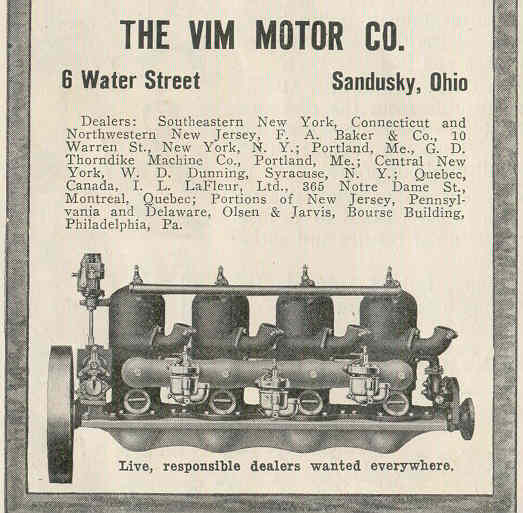 |
    
solarrog
Senior Member
Username: solarrog
Post Number: 214
Registered: 03-2002

| | Posted on Sunday, January 22, 2006 - 05:50 pm: | 




|
I www.enginads.com/boatngin.cgi/read/2041 see Doug has it forsale over on the marine site.
note from Andrew:
He has it for sale in our classifieds at this link
I offered to help him with pictures when I saw that he was posting it for sale and didn't have complete information about it... |
    
thomas
Senior Member
Username: thomas
Post Number: 319
Registered: 07-2002

| | Posted on Sunday, January 22, 2006 - 06:31 pm: | 




|
From Oct 1911 Rudder. States that "Five types-2 to 4 Cylinders-13 to 55 HP ) This is for the EXTREME HIGH SPEED class.
Looks like Doug's might be maybe '09-'11 or so?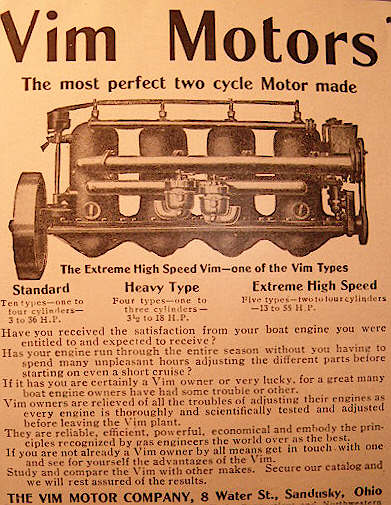 |
    
thomas
Senior Member
Username: thomas
Post Number: 320
Registered: 07-2002

| | Posted on Sunday, January 22, 2006 - 06:32 pm: | 




|
From Oct 1911 Rudder. States that "Five types-2 to 4 Cylinders-13 to 55 HP ) This is for the EXTREME HIGH SPEED class.
Looks like Doug's might be maybe '09-'11 or so? |
    
Doug Ishamel
Visitor
| | Posted on Sunday, January 22, 2006 - 07:31 pm: | 




|
I would like to thank each of you for the research and history you have provided. It has proved invaluable to me in identifying this motor. Without your expertise and extensive help, I would still be trying to figure out what it is. A sincere thank you to you all.
Doug |
    
puttputtputt
New member
Username: puttputtputt
Post Number: 1
Registered: 02-2009
| | Posted on Saturday, February 07, 2009 - 03:18 pm: | 




|
Hello Andrew
I recently turned up a VIM single cylinder 3HP, #794 in a junk store. It's now in my garage waiting for a rebabbitting job and a water pump. Hope to have it on the water this summer. It was interesting to find your VIM discussion on-line and I do hope other VIM people will keep in touch with the site.
. . . . . puttputtputt . . . . . |
    
keith
Senior Member
Username: keith
Post Number: 236
Registered: 02-2002

| | Posted on Saturday, February 07, 2009 - 06:13 pm: | 




|
puttputtputt,
I currently have the 3 cylinder #777 shown at the begining of this string. Is you engine the same style?
Keith |
    
puttputtputt
New member
Username: puttputtputt
Post Number: 2
Registered: 02-2009
| | Posted on Saturday, February 07, 2009 - 09:08 pm: | 




|
Hello Keith
My engine has many of the same details, common to all VIMs, - the hand-hole covers, the four
round holes in the flywheel, the rounded cylinder top. The timer is different, as it should be for a single. An interesting point,- if serial numbers were assigned consecutively, my engine is contemporary with yours, perhaps just days or weeks later.
I hope I will soon make it go
puttputtputt |


